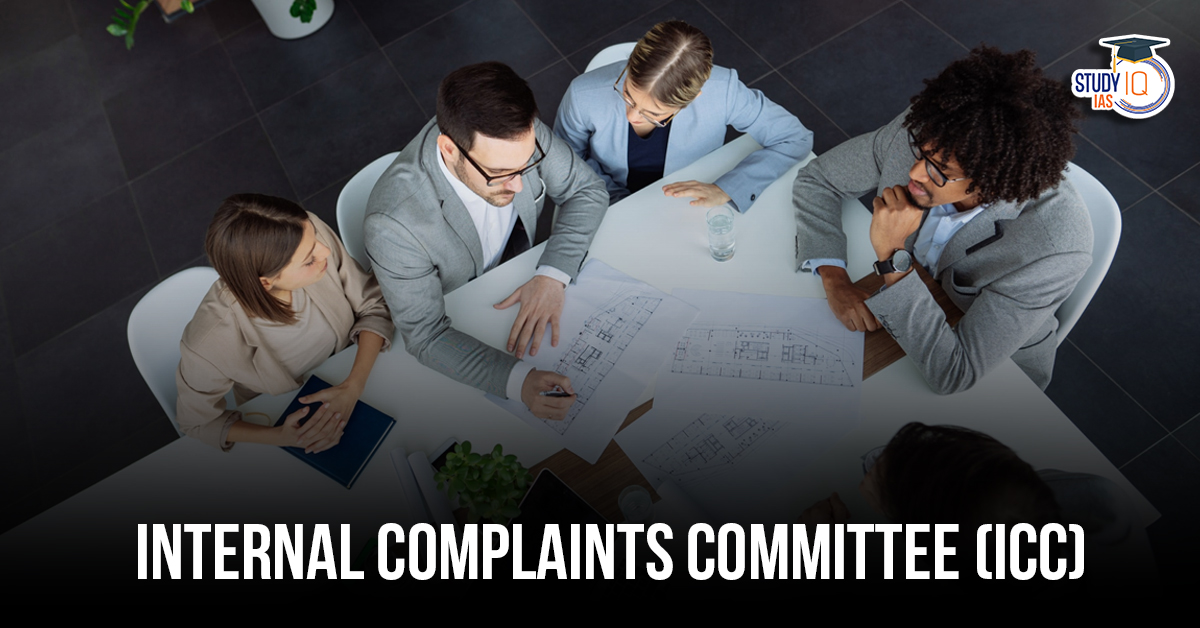Context
- A student in Balasore, Odisha, died by self-immolation after her sexual harassment complaint against her department head was dismissed by the college’s Internal Complaints Committee (ICC).
- Her family claims the ICC was biased and poorly trained, raising concerns over the fairness and effectiveness of institutional grievance redressal mechanisms.
Internal Complaints Committee (ICC)
The Internal Complaints Committee (ICC), or simply the Internal Committee (IC), is a statutory body that is required to be formed in workplaces in India under the Sexual Harassment of Women at Workplace (Prevention, Prohibition and Redressal) Act, 2013 (the PoSH Act).
The sole aim of the ICC is to prevent and redress sexual harassment of women at the workplace, thus creating a safe, secure, and dignified workplace.
Origin & Legal Foundation
Vishaka Guidelines (1997)
- Laid down by the Supreme Court of India in Vishaka & Others vs. State of Rajasthan.
- Triggered by the gang-rape of Bhanwari Devi, a social worker who tried to stop child marriage.
- First legal recognition of sexual harassment as a violation of fundamental rights under Articles 14, 15, 19, and 21.
- Mandated all workplaces to create complaints committees.
Statutory Backing: POSH Act (2013)
- The Sexual Harassment of Women at Workplace (Prevention, Prohibition and Redressal) Act, 2013
- Converted the Vishaka Guidelines into enforceable law.
- Mandated the formation of an Internal Complaints Committee (ICC) in every workplace with 10 or more employees.
Composition of ICC (Under POSH Act)
- Presiding Officer: A senior woman employee (mandatory)
- Two or more members: With legal knowledge or experience in social work
- External Member: From an NGO or legal field (to ensure independence)
- At least 50% members must be women
Powers and Functions
Quasi-judicial powers
- Can summon individuals and require the production of documents.
- Conduct inquiry similar to a civil court under the Code of Civil Procedure.
Duties
- Inquire into complaints of sexual harassment.
- Submit findings to the employer with recommended action (warning, termination, deduction of salary, etc.)
- Ensure confidentiality, protection to the complainant, and awareness programs.
Definition of Sexual Harassment (under Section 2(n), POSH Act)
- Physical contact and advances
- A demand or request for sexual favours
- Sexually colored remarks
- Showing pornography
- Any other unwelcome physical, verbal, or non-verbal conduct of a sexual nature
Status of Implementation (as of recent reports)
Widespread Non-Compliance
- Many private and government organisations fail to constitute ICCs
- Lack of external members, absence of gender balance, or completely missing ICCs are common.
- Annual compliance reports (mandatory under Rule 14) are often not submitted.
Cases of misuse and underreporting
- Many women do not report due to fear of retaliation or reputational damage.
- Sometimes ICCs are used to suppress whistleblowers rather than support them.
Landmark Cases & Developments
- Farooqui Case: Highlighted the legal grey areas in consent and workplace relationships.
- Tata Consultancy Services vs. Jane Doe: Reaffirmed ICC’s internal jurisdiction.
- #MeToo Movement: Sparked mass public discourse; exposed failure of ICCs in major corporations and media houses.
Challenges
- Lack of awareness among employees
- Poor training of ICC members
- Employer bias or interference in proceedings
- No protection for third-party women (e.g., clients, vendors) in some cases
- No time-bound oversight body to monitor implementation across India


 Particularly Vulnerable Tribal Groups (P...
Particularly Vulnerable Tribal Groups (P...
 Geo-tagging of Buildings During Upcoming...
Geo-tagging of Buildings During Upcoming...
 Gender Gap in Educational Expenditure in...
Gender Gap in Educational Expenditure in...

























